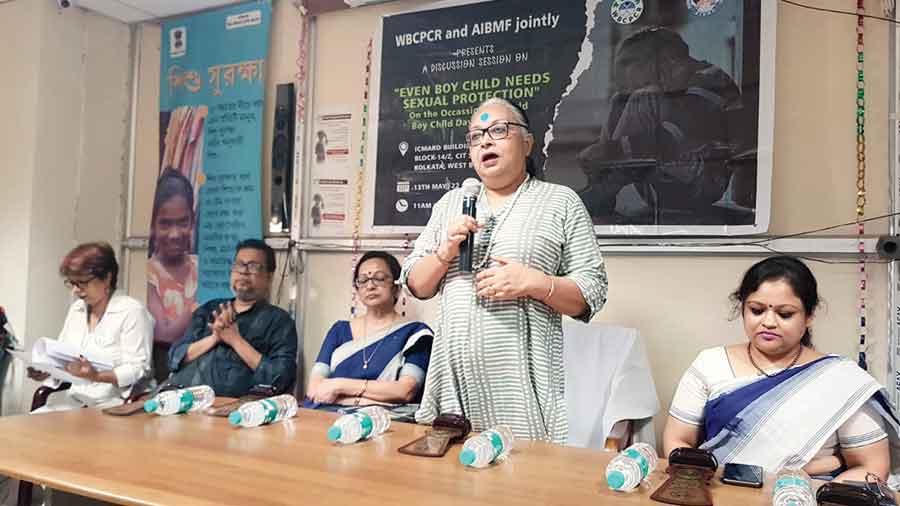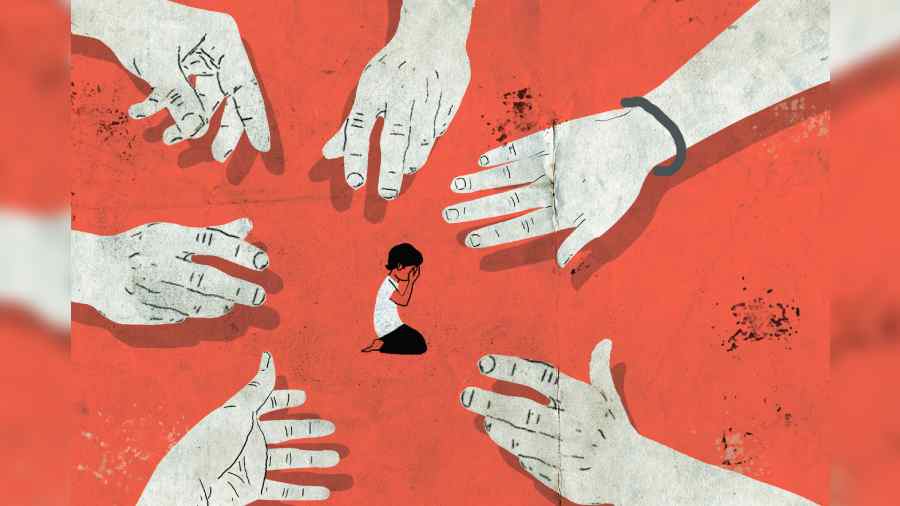A 2007 government study on child abuse found that 52 per cent of those who reported to have been sexually abused were boys. Surprised? Don’t be. Abuse against boys is more common than we think and a recent seminar aimed to create awareness to protect the boy child.
The seminar was conducted by West Bengal commission for protection of child rights (WBCPCR) and the New Town-based All India Boys and Men’s Forum (AIBMF) at the Ultadanga office of the commission. It was held to observe World Boy Child Day a few weeks ago.
Teachers turn tormentors
The seminar brought forward adults, who had been survivors of abuse as children, and the most common perpetrators, they said, were teachers.
“If we failed to get our lesson right, our lady tutor would strip the boys to a semi-nude state and molest us,” said a man who was trembling while recounting the experiences. “I eventually told my parents about it but this was in the early 2000s when there was no awareness about such things. All my parents could do was change my tutor.”
Another man said he was molested by his art teacher in school. “I was too young to understand that I was being violated. Then again, when I was a little older, I was molested by the ticket checker on a train. This time I fought back but only because I now had the awareness,” he said.
Toxic aunts and aunties
Women can be vicious perpetrators. Sreemoyee Sen Ram, founder of RACSHA (Rise Against Child Sexual Harm & Abuse), recounted the case of a physically challenged boy — one of his hands was not operational — who would get violated by his aunt and domestic help. “They would insist on bathing him despite the boy’s protests and fondle him,” she said.
“In our experience, as much as 20 per cent of offenders against boys involve female perpetrators. They tend to be either adult women who have sexual relationships with teenage boys, teenage girls who take advantage of younger boys and women who are cajoled to participate in the recruitment and abuse (trafficking) of children by their boyfriends, husbands or family members,” said Sen Ram.
Another shocking incident was shared by Rima Mukherji, consultant psychiatrist and director of the mental wellness clinic Crystal Minds. The incident had happened to her own son Abhik Mukherjee, a 30-something man who himself works towards an abuse-free world now.
“This happened in the UK when my son was five or six years old. His baby sitter — an extremely respectable British lady — would drive him to the swimming pool but it turned out he was wetting himself in her car. This was a red flag as he had achieved control long back and wasn’t suffering from incontinence anywhere but with her,” said Mukherji. The child later told his mother the nanny had been abusing him.
Another survivor, now a pepper-haired man, spoke up at the meet. “When I was in Class X, I would be abused by a neighbour who was so close to my family that I would call her ‘mashi’. She would lure me into her house when alone.
I still haven’t been able to tell my parents about this and the lady would behave as if she was doing me favours. How unmanly would I be for refusing sexual advances from a woman? She would ridicule me for trying to stop it,” said the man who was sharing his trauma in public for the first time.

Ananya Chakraborti, chairperson, state commission for protection of child rights, speaks at the seminar at the commission’s Ultadanga centre. Picture by Brinda Sarkar
Bullying turns to abuse
Deep Purkayastha, founder director of Praajak, an NGO that works for child protection, said there was but a thin line between bullying and sexual abuse. “This becomes pronounced in all-boy schools and environments. “They’ll harass a boy till he breaks down and declare that he cries like a girl. They’ll then pull down his pants to verify if he’s really a boy,” he said.
Such things are rampant in society and boys as young as 13 could be doing this to 10-year-olds. “The harassment of effeminate boys often leads to assault too. It is we who lack the lens to see this as sexual abuse and pass it off as harmless ragging,” said Purkayastha.
Mukherji shared another frightening incident of her son being assaulted by seniors when he was only in Class VI. “One of them gagged his mouth in the toilet while another did it. They did it to him again in the back seat of their school bus,” she said about the boy who not only lost his self-esteem and academic concentration but even tried to strangle himself in desperation thereafter.
Why boys don’t report
Being a mental health professional, Mukherji sensed her son was traumatised and eventually managed to extract the truth from him. The incidents were reported in school and action was taken against the perpetrators.
“But in 99 per cent of such cases, the boy would have been told: ‘Tui okey ekta thatiye chor marte parli na?’” noted Mukherji. “As if it was the victim’s failure to protect himself. Being a male, that’s his primary duty.”
Ananya Chakraborti, chairperson, WBCPCR, said gender roles are assigned to children from birth and it is a baggage they have to carry their whole lives. “Who has decided that ‘boys don’t cry’? That ‘mard ko dard nahin hota’?” These stereotypes are the reason why boys who are violated are uncomfortable about speaking up.”
Another man recounting his experience said he had been molested by a stranger in a van when he was in Class VII. “I had read in newspapers that such things happen to girls but I had no idea it could happen to boys. I thought of telling my parents but I thought my father would beat me for it,” said the man, who was so nervous while speaking that Nandini Bhattacharya, president of AIBMF, had to stand next to him for mental support.
Bhattacharya shared that many people actually held the misconception that Pocso (Protection of Children from Sexual Offences Act) was applicable only to girls. “So all the abused boys suffer in silence. This repression can manifest itself in unnatural ways later in their sexual lives,” she said.
Purkayastha observed that sexual violence against boys only gets reported in case of serious medical problems. “A 2007 study on child abuse by the ministry of women and child development found that 52 per cent of those who reported abuse were boys but also that most of these were ‘milder’ forms of abuse. Many boys have come to believe that such mild abuse happens to everyone and that they have to accept it,” he said.
Sudeshna Roy, special consultant of WBCPCR, however, mentioned who last year’s Bir Purush Award, conferred by the commission, went to. “It went to a boy living in a child care home who had sent a chit to his mother, alleging that the attendants at the home had been sexually abusing them. We looked into the matter and the home was shut down. It takes a lot of courage to do what the boy did and should set a precedent.”
False family honour
Chakraborti noted that most abuse cases that come to light take place in schools or public places. “Because those at home, perpetrated by fathers and uncles are quelled to save ‘family honour’,” she shrugged.
Rupa Singh, inspector, special juvenile police unit, detective department of Calcutta Police, couldn’t agree more. “A couple of months ago an extremely scared child called Childline (1098) and said she was being sexually abused by her father. We rushed over but couldn’t get her to give one sentence on record as her family had brainwashed her by then. They told her that if her father — the only earning member — went to jail, they would starve to death. Although this was a girl, boys trying to raise their voices suffer similar fates,” said Singh.
The police officer also observed that cyber crime involving minors was on the rise. “Exchanging nude pictures and the like has increased rampantly during the lockdowns, when kids got addicted to smartphones,” she said, urging parents to keep tabs on their wards’ online activities.
Gender justice for all
If boys have it this tough, imagine the challenges faced by transgender children! Ankan Biswas, himself a trans man and an advocate of the state legal services authority, shared their harassment. “Many police personnel in the districts are insensitive towards them, some mental health professionals refuse to write prescriptions for them… there is a lot to be done for this section of children,” said Biswas, himself a survivor of childhood abuse.
Chakraborti reiterated that Pocso was gender-neutral. “It applies to anyone under the age of 18,” she said, though admitting that in some cases the police do not believe boys’ cases easily.
Red flags
“Parents won’t leave a girl child alone in a room with a tutor but it never occurs to them that the boy child can be vulnerable too,” noted Mukherji, asking parents to be alert. “If you see your young son touching himself or displaying sexually inappropriate behaviour, don’t scold him. Rather, investigate if he may have been touched by an adult. Could he have been shown pornography by a perpetrator?”
If a girl shows behavioural problems, mental health workers, she said, are trained to assess whether she may have been a victim of abuse. “But we are not trained to think so about boys. Boys could get aggressive, promiscuous, suicidal, but will still get benefit of doubt as apparently this is just boys being boys. One seldom thinks they may be victims of sexual abuse,” said Mukherji.
Victim to survivor
Sen Ram says one must be extremely sensitive in approaching a child who may have been a victim of abuse. “He will be scared, may not be able to articulate what happened and may not want to open up in the first place. So one cannot interrogate him. One has to approach him with great care,” she said.
Once the child shares what happened, Mukherji says the first thing to do is to validate him. “Tell him you understand what a terrible thing he was subjected to and that your heart goes out to him. You must assure him that you will do everything to help him heal and move on,” she said. “Speak from a position of strength. If your son sees his parent breaking down how will he ever handle the situation?”
How can our children be better protected from sexual abuse? Write to The Telegraph Salt Lake, 6 Prafulla Sarkar Street, Calcutta 700001 or email to saltlake@abp.in
